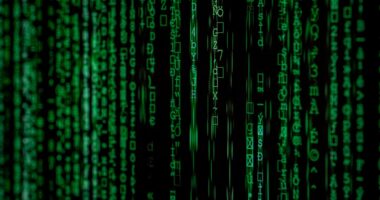Non-fungible tokens (NFTs) have revolutionized the art world by providing artists with a novel method to exhibit and sell their digital creations. NFTs are unique digital assets that represent ownership or authenticity of specific items or content, including artwork, videos, and music. Unlike fungible cryptocurrencies such as Bitcoin or Ethereum, which can be exchanged on a one-to-one basis, NFTs are non-fungible, meaning each token is distinct and cannot be directly exchanged for another.
NFTs utilize blockchain technology, ensuring each token’s uniqueness and preventing replication. This technology offers a secure and transparent system for artists to sell their digital works, as ownership and provenance are recorded on the blockchain. This innovation has created new opportunities for artists to monetize their digital art, allowing them to sell directly to collectors and maintain greater control over the sales process, bypassing traditional intermediaries like galleries and auction houses.
In recent years, NFTs have gained considerable attention and popularity, with high-profile sales generating global headlines. The NFT market has expanded to include various forms of digital art, music, and other creative works, demonstrating significant potential for artists. However, for those new to the concept, navigating the NFT landscape can be challenging.
Understanding the fundamentals of NFTs and their potential benefits is essential for artists looking to explore this emerging market.
Key Takeaways
- NFTs are unique digital assets that represent ownership of a specific item or piece of art, and are stored on a blockchain.
- Top NFT marketplaces for artists include OpenSea, Rarible, and Foundation, each offering different features and benefits for creators.
- When choosing the right NFT marketplace for your art, consider factors such as fees, community engagement, and platform security.
- Showcasing your NFT art successfully involves creating high-quality visuals, engaging with the community, and promoting your work across social media platforms.
- Artists can explore opportunities in the NFT space through roles such as creating digital art, collaborating with brands, and participating in virtual art events.
Top NFT Marketplaces for Artists: A Comparison of Features and Benefits
As the popularity of NFTs continues to grow, numerous NFT marketplaces have emerged, offering artists a platform to showcase and sell their digital artwork. Each marketplace has its own unique features and benefits, catering to different types of artists and collectors. Understanding the differences between these platforms is essential for artists looking to enter the NFT space and maximize their opportunities for success.
One of the most well-known NFT marketplaces is OpenSea, which has quickly become a go-to platform for buying, selling, and trading NFTs. OpenSea offers a wide range of digital assets, including art, domain names, virtual worlds, and more. The platform is known for its user-friendly interface and low fees, making it an attractive option for artists looking to get started in the NFT space.
Another popular marketplace is Rarible, which allows artists to create and sell their own NFTs without the need for coding skills. Rarible also offers a decentralized governance structure, giving users a say in the platform’s development and direction. For artists looking to target a specific niche or audience, platforms like Foundation and Zora may be more suitable.
Foundation focuses on supporting digital artists and creators, offering a curated selection of high-quality NFTs. The platform prides itself on its community-driven approach and commitment to showcasing innovative digital artwork. Zora, on the other hand, is designed for creators who want to retain more control over their work and pricing.
Zora allows artists to create dynamic pricing models for their NFTs, giving them flexibility in how they sell their digital creations.
How to Choose the Right NFT Marketplace for Your Art: Factors to Consider

When it comes to choosing the right NFT marketplace for your art, there are several factors to consider. Each platform has its own unique features, community, and target audience, so it’s important to carefully evaluate your options before deciding where to showcase and sell your digital artwork. One of the first things to consider is the type of artwork you create and whether it aligns with the focus of a particular marketplace.
Some platforms cater specifically to digital artists, while others may have a broader range of digital assets available. Understanding where your work fits best will help you narrow down your options and find the right platform for your art. Another important factor to consider is the community and audience of each marketplace.
Some platforms have a strong focus on building a supportive community of artists and collectors, while others may prioritize high-value sales and exclusive content. Depending on your goals as an artist, you may prefer a platform that offers opportunities for collaboration and networking, or one that focuses on maximizing sales potential. Fees and pricing structures are also crucial considerations when choosing an NFT marketplace.
Some platforms charge higher fees for listing and selling NFTs, while others offer more competitive pricing options. Understanding the fee structure of each platform will help you make informed decisions about where to sell your art and how to maximize your earnings.
Showcasing Your NFT Art: Tips for Success on NFT Marketplaces
Once you’ve chosen the right NFT marketplace for your art, it’s important to understand how to effectively showcase your work and maximize your chances of success. With so many artists entering the NFT space, standing out and attracting collectors can be challenging. However, with the right approach and strategies, you can increase your visibility and appeal to potential buyers.
One key tip for success on NFT marketplaces is to create high-quality and engaging artwork that resonates with your target audience. Whether you specialize in digital paintings, 3D sculptures, or animated videos, focusing on creating unique and compelling pieces will help you capture the attention of collectors. Investing time and effort into refining your craft and developing a distinct artistic style can set you apart in a crowded marketplace.
Building a strong online presence is also essential for showcasing your NFT art effectively. Utilize social media platforms, artist communities, and online galleries to share your work and connect with potential buyers. Engaging with your audience, sharing behind-the-scenes content, and participating in relevant discussions can help you build a loyal following and attract attention to your NFTs.
Another important aspect of showcasing your NFT art is pricing it appropriately. Researching similar artworks on the marketplace and understanding current trends in the NFT space will help you determine fair and competitive prices for your work. Offering transparent pricing and value for collectors will increase the likelihood of your NFTs being sold and appreciated by buyers.
NFT Jobs: Exploring Opportunities for Artists in the NFT Space
The rise of NFTs has not only created new opportunities for artists to sell their work but has also opened up a range of job opportunities within the NFT space. As the demand for digital art and collectibles continues to grow, various roles have emerged that cater specifically to the needs of artists and creators in the NFT market. One of the most prominent job opportunities in the NFT space is that of an NFT curator or art director.
Curators play a crucial role in selecting high-quality digital artwork for sale on NFT marketplaces, ensuring that only the best pieces are showcased to collectors. This role requires a keen eye for artistic talent, an understanding of current trends in the digital art world, and strong connections within the artist community. Another emerging job opportunity is that of an NFT marketing specialist or community manager.
With so many artists vying for attention on NFT marketplaces, there is a growing need for professionals who can help promote and market digital artwork effectively. Marketing specialists can help artists build their brand, reach new audiences, and engage with collectors through strategic promotional campaigns and community management. Additionally, as blockchain technology continues to evolve, there is a demand for developers and technologists with expertise in creating and managing NFT platforms.
Roles such as smart contract developers, blockchain engineers, and platform architects are essential for building and maintaining the infrastructure that supports NFT marketplaces.
Navigating the Legal and Copyright Issues of NFT Art: What Artists Need to Know

As with any form of digital content creation, navigating legal and copyright issues is crucial for artists entering the NFT space. The decentralized nature of blockchain technology presents unique challenges when it comes to protecting intellectual property rights and ensuring that artists are fairly compensated for their work. One key consideration for artists creating NFTs is ensuring that they have clear ownership rights over their digital artwork.
Before minting an NFT, it’s important to verify that you have the legal right to sell the piece and that there are no existing copyright or licensing issues that could pose a risk to potential buyers. Understanding licensing agreements and intellectual property laws is also essential for artists looking to enter the NFT space. Depending on the type of artwork you create and any third-party assets you may use, you may need to secure appropriate licenses or permissions before minting an NFT.
This is particularly important when using elements such as music, images, or other copyrighted material in your digital artwork. Another legal consideration for artists entering the NFT space is ensuring transparency and clarity in their sales contracts. Clearly outlining the terms of ownership, usage rights, royalties, and any other relevant details in your NFT sales agreements will help protect both you as the artist and your buyers.
The Future of NFT Marketplaces: Trends and Innovations for Artists
As the NFT market continues to evolve, several trends and innovations are shaping the future of NFT marketplaces for artists. From advancements in technology to changing consumer behaviors, understanding these developments can help artists stay ahead of the curve and capitalize on new opportunities in the NFT space. One notable trend in the world of NFTs is the rise of fractionalized ownership and decentralized autonomous organizations (DAOs).
These concepts allow multiple individuals to own shares of an NFT or participate in collective decision-making processes related to digital artwork. This trend has the potential to democratize ownership of art and create new ways for artists to engage with their audience. Another key innovation in NFT marketplaces is the integration of augmented reality (AR) and virtual reality (VR) technology.
By allowing collectors to experience digital artwork in immersive virtual environments or through AR applications, these advancements are enhancing the way art is showcased and appreciated in the digital realm. Furthermore, as environmental concerns related to blockchain technology continue to be raised, there is a growing focus on developing more sustainable solutions for minting and trading NFTs. This includes exploring alternative consensus mechanisms that consume less energy and implementing carbon offset initiatives within NFT marketplaces.
In conclusion, understanding the fundamentals of NFTs, choosing the right marketplace for your art, showcasing your work effectively, exploring job opportunities in the NFT space, navigating legal considerations, and staying informed about future trends are all essential aspects of succeeding as an artist in the world of non-fungible tokens. By staying informed about these topics and adapting to changes in the industry, artists can position themselves for success in this exciting new frontier of digital art.
If you’re an artist looking to break into the world of NFTs, you may also be interested in learning about the potential job opportunities in the NFT space. Check out this article on NFT Jobs to explore the various roles and positions available in the NFT industry. It’s a great resource for artists who want to not only showcase their work but also potentially find employment within the NFT marketplaces.
FAQs
What are NFT marketplaces?
NFT marketplaces are online platforms where artists can showcase and sell their digital artwork as non-fungible tokens (NFTs). These marketplaces use blockchain technology to verify the ownership and authenticity of digital assets.
How do NFT marketplaces benefit artists?
NFT marketplaces provide artists with a new way to monetize their digital artwork by selling them as unique digital assets. Artists can also receive royalties from secondary sales of their NFTs, providing a potential source of ongoing income.
What are some popular NFT marketplaces for artists?
Some popular NFT marketplaces for artists include OpenSea, Rarible, Foundation, and SuperRare. These platforms offer artists the opportunity to showcase and sell their digital artwork to a global audience of collectors and enthusiasts.
How do artists get paid on NFT marketplaces?
When an artist sells an NFT on a marketplace, they receive payment in the form of cryptocurrency, typically Ethereum. The artist can then convert the cryptocurrency into fiat currency through a cryptocurrency exchange.
What should artists consider when choosing an NFT marketplace?
When choosing an NFT marketplace, artists should consider factors such as the platform’s fees, user interface, community engagement, and the marketplace’s reputation within the NFT space. It’s also important to consider the marketplace’s approach to environmental sustainability, as NFTs have been criticized for their energy consumption.





